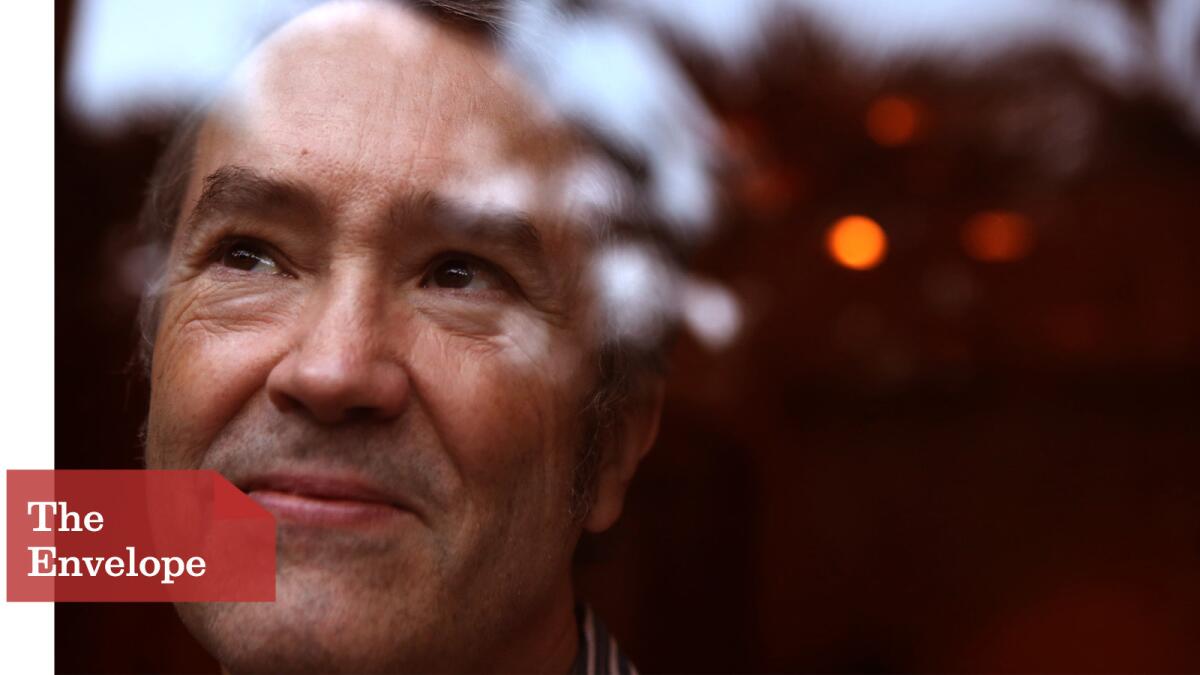For composer Carter Burwell, the film score drives the subtext

Carter Burwell says he likes to compose music that adds information to the film rather than just echoing what’s on screen. He wrote the scores for “Anomalisa,” “Carol,” “Legend” and “Mr. Holmes.”
- Share via
Carter Burwell doesn’t usually write the kind of big, sweeping music one associates with Oscar scores; he settles into the films he works on and provides colors that might have otherwise been missing from their palettes — such as subtext.
“Some people assume our job is to echo whatever’s going on on-screen,” says the soft-spoken composer in an interview with The Envelope. “Someone gets punched and the music goes, ‘Bwamm!’ They fall in love and the strings swell. My favorite thing to do is to play something you’re not seeing and to contribute some new information.”
Burwell has forged long collaborations with directors such as the Coen brothers, Todd Haynes, Bill Condon and writer-director Charlie Kaufman, among others. For Haynes’ drama “Carol,” the story of an emerging lesbian love amid the social repression of the 1950s, Burwell provides the sort of subtext he describes.
SIGN UP for the free Indie Focus movies newsletter >>
“Todd would agree: These characters don’t really have the vocabulary necessary to say what they’re [feeling], it hasn’t been developed for them,” he says. “I think one thing Patricia Highsmith did in writing this book was to help develop it.”
Burwell’s periodish gentle jazz score also features the solo piano of “To Carol’s,” accompanying Therese (Rooney Mara) and Carol’s (Cate Blanchett) cab ride in a kind of emotion-drunk daze.
“Todd shot it very subjectively,” says Burwell, “so I took that as an opportunity to write something that wouldn’t be of the period. It would be about how, in those situations, time dissolves and feelings build up.
“It’s a piano piece, but the left hand is playing this rhythm that piles up into a cloud of notes. I used these delays to have the notes accumulate and accumulate and accumulate until you can’t really tell where the beat is anymore. That was supposed to suggest that feeling of, ‘Time no longer exists, we’re in this special state.’
“They shot it in a way that gave me license to do that.”
Burwell had more than license in collaborating with Kaufman on the stop-motion “Anomalisa.” The project began 10 years ago, when Burwell was considering retiring from film composing. The composer, who had scored the Kaufman-scripted film “Adaptation,” asked the writer to come up with something he might score for staged readings. Kaufman pledged a one-act play, and “Anomalisa” was born.
“In the end, the important thing in the music was to really be there with the emotional life of these characters,” says Burwell. “The music is there to hopefully coax the audience into opening their hearts to these characters who have, although they’re puppets, opened their hearts to you.”
The film’s delicate balance is embodied in tracks such as “Fregoli Bar.” It’s the kind of lounge-lizard piano-bar tinkling that could evoke laughter, but it’s also touched with moments of lonely, empty-chambered beauty. That title will also have haunting significance to viewers who investigate it — not recommended until after watching the film.
“You could judge that piece as kitschy, and it is, and there are any number of ways you could dismiss the characters — Lisa [Jennifer Jason Leigh, in a quietly heartbreaking vocal performance] constantly dismisses herself as being boring and unintelligent and ugly,” says the composer. “But that’s the point of the film, to force you to confront things and people you might dismiss and just go with them and see the beauty in them.”
Of Burwell’s four scores this year, “Mr. Holmes” might be the most conventional. But that doesn’t mean the subtle music for Condon’s chronicle of the great detective’s twilight years is elementary.
“It’s 1946, so he’s got his feet in two centuries,” says Burwell. “So the music is clearly pointing backwards, but sometimes it’s saying, ‘This is the 20th century,’ taking 20th century approaches to harmony and rhythm.
“The main theme is Holmesian; it turns back upon itself, it has its mysteries. I think you could see it being in a Sherlock Holmes film, but it does sometimes kind of stall and fall apart because that’s what’s happening to him.”
Meanwhile, the score for the ‘60s-England-set gangster movie “Legend” is neither the British-Invasion flavor one might expect (Burwell laughs as he accepts the description of it as “proto-Swinging-London-jazz-rock”), nor high-tension, shoot-’em-up music.
“The relationship between the brothers is the heart of the movie, not the gangland stuff,” he says. “Reg can’t leave, not just because they have a business together, but because Ron can’t exist without him. As much as Ron’s a violent psychopath, he’s a fragile violent psychopath. I didn’t necessarily see him that way; it was [writer-director] Brian Helgeland.
“I had written this theme for [the love interest], this guitar ballad, and he said, ‘Let’s put that against Ron.’ I would never have dreamed of it, but it really brought out his vulnerability and changed the way I thought of the character.”
Burwell says the music is also about growing up.
“Ron and Reg are living like they’re kids. It’s the great thing about being a gangster; it’s all candy — candy and violence.”
Follow The Times’ complete coverage of the Golden Globes and Oscars
More to Read
From the Oscars to the Emmys.
Get the Envelope newsletter for exclusive awards season coverage, behind-the-scenes stories from the Envelope podcast and columnist Glenn Whipp’s must-read analysis.
You may occasionally receive promotional content from the Los Angeles Times.










